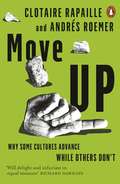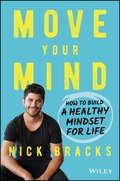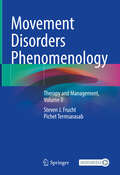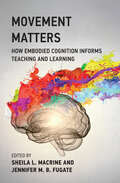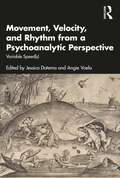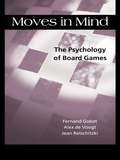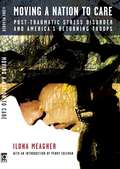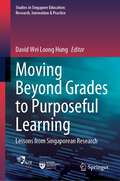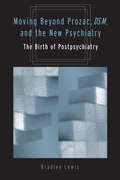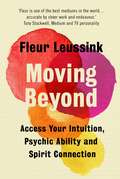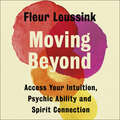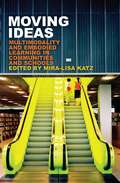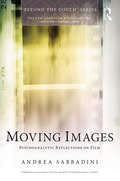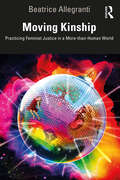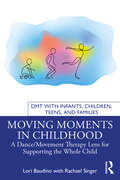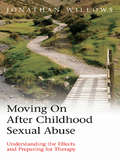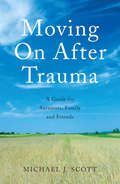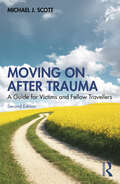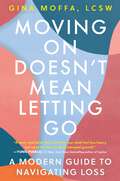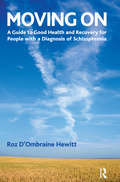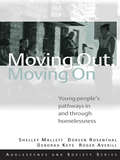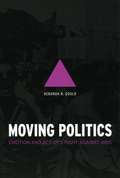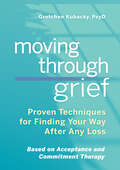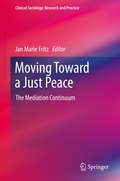- Table View
- List View
Move Up: Why Some Cultures Advance While Others Don't
by Clotaire Rapaille Andrés RoemerWith an abundance of data and evidence, Move UP explores the societal and biological factors that determine whether cultures are able to ascend socially, economically and intellectually. This provocative, ambitious and entertaining book devises a formula that will allow countries and individuals to assess their own potential for upward mobility. Drawing on science and statistics as much as on human instinct and emotion, Move UP reconsiders the modern world with a motion to improving it.
Move Your Mind: How to Build a Healthy Mindset for Life
by Nick BracksLearn how to create new daily habits that build happiness and reduce stress In Move Your Mind, acclaimed actor, entrepreneur, and mental health advocate Nick Bracks delivers the practical tools and lessons that will help you make small, but measurable, daily changes to foster positive, lasting improvements to your mental health. Told through the author’s own experiences with mental illness, this book offers a holistic approach to improving your mental health, and shows readers how to make positive lifestyle changes in areas like exercise, nutrition, sleep, mindfulness, and meditation. The book offers: Valuable and insightful case studies of real and well-known people who took control of and improved their mental wellbeing Key research findings from industry leaders in mindfulness, meditation, memory, mental health, psychology, and performance Guidance on how to take small, gradual steps that lead to big changes in your motivation and inspiration Perfect for anyone who has tried to take ownership of their own mental health but lacked the time, motivation, or information to effectively make a change, Move Your Mind is an indispensable guide to creating long-term behavior changes that promote increased happiness, decreased anxiety and stress, and better relationships.
Movement Disorders Phenomenology: Therapy and Management, Volume II
by Steven J. Frucht Pichet TermsarasabThis practical, case-based book offers an approach to diagnosis and treatment of movement disorders in the outpatient setting. The major hypokinetic and hyperkinetic disorders are considered in turn, with more than 1,000 videos illustrating the role of phenomenology in the diagnosis and treatment of these conditions. Discussion of the role of ancillary testing (imaging, genetic testing) and treatment options with medications, botulinum toxin injections, and surgical intervention are woven in to the discussion of cases throughout the book. Special attention is directed to pitfalls and perils of office-based practice. This volume will be of interest to movement disorders neurologists and trainees, general neurologists, neurology residents, and any healthcare professional with an interest in exploring the application of the many treatments that have transformed movement disorders into a therapeutic field. Rather than a textbook of movement disorders, thisvolume will help the practicing clinician in guiding the thought process for evaluation and management of patients in the clinic.
Movement Matters: How Embodied Cognition Informs Teaching and Learning
by Edited by Sheila L. Macrine and Jennifer M. B. FugateExperts translate the latest findings on embodied cognition from neuroscience, psychology, and cognitive science to inform teaching and learning pedagogy.Embodied cognition represents a radical shift in conceptualizing cognitive processes, in which cognition develops through mind-body environmental interaction. If this supposition is correct, then the conventional style of instruction—in which students sit at desks, passively receiving information—needs rethinking. Movement Matters considers the educational implications of an embodied account of cognition, describing the latest research applications from neuroscience, psychology, and cognitive science and demonstrating their relevance for teaching and learning pedagogy. The contributors cover a range of content areas, explaining how the principles of embodied cognition can be applied in classroom settings. After a discussion of the philosophical and theoretical underpinnings of embodied cognition, contributors describe its applications in language, including the areas of handwriting, vocabulary, language development, and reading comprehension; STEM areas, emphasizing finger counting and the importance of hand and body gestures in understanding physical forces; and digital learning technologies, including games and augmented reality. Finally, they explore embodied learning in the social-emotional realm, including how emotional granularity, empathy, and mindfulness benefit classroom learning. Movement Matters introduces a new model, translational learning sciences research, for interpreting and disseminating the latest empirical findings in the burgeoning field of embodied cognition. The book provides an up-to-date, inclusive, and essential resource for those involved in educational planning, design, and pedagogical approaches. ContributorsDor Abrahamson, Martha W. Alibali, Petra A. Arndt, Lisa Aziz-Zadeh, Jo Boaler, Christiana Butera, Rachel S. Y. Chen,Charles P. Davis, Andrea Marquardt Donovan, Inge-Marie Eigsti, Virginia J. Flood, Jennifer M. B. Fugate, Arthur M. Glenberg, Ligia E. Gómez, Daniel D. Hutto, Karin H. James, Mina C. Johnson-Glenberg, Michael P. Kaschak, Markus Kiefer, Christina Krause, Sheila L. Macrine, Anne Mangen, Carmen Mayer, Amanda L. McGraw, Colleen Megowan-Romanowicz, Mitchell J. Nathan, Antti Pirhonen, Kelsey E. Schenck, Lawrence Shapiro, Anna Shvarts, Yue-Ting Siu,Sofia Tancredi, Chrystian Vieyra, Rebecca Vieyra, Candace Walkington, Christine Wilson-Mendenhall, Eiling Yee
Movement, Velocity, and Rhythm from a Psychoanalytic Perspective: Variable Speed(s)
by Julia Morgan Jessica DatemaMovement, Velocity, and Rhythm from a Psychoanalytic Perspective: Variable Speed(s) explores philosophical and psychoanalytic theories, as well as artworks, that show sensible bodily rituals for reviving our social and subjective lives. With a wide range of contributors from interdisciplinary backgrounds, it informs readers on how to find rituals for syncing ourselves with others and world rhythms. The book is divided into three parts on variability, speed, and slowness, and explores rhythmic rituals of renewal, revolution, and reflection. Each chapter provides unique examples from the applied arts, film, television, and literature to show how different practices of rhythm might aid in creative and deep contemplation and includes philosophical and cultural theories for bodily and rhythmic renewal. Without being limited to a clinical perspective, this book provides wide-ranging discussions of the relation between rhythm, trauma, cultural studies, psychosocial studies, continental philosophy, critical psychology, Lacan, and film, to explore modes of becoming more attuned to each moment, to others, and to our own era. Movement, Velocity, and Rhythm from a Psychoanalytic Perspective will be essential reading for Lacanian psychoanalysts in practice and in training, as well as anyone interested in rhythm at the intersection of Lacanian psychoanalysis and continental philosophy.
Moves in Mind: The Psychology of Board Games
by Fernand Gobet Jean Retschitzki Alex de VoogtBoard games have long fascinated as mirrors of intelligence, skill, cunning, and wisdom. While board games have been the topic of many scientific studies, and have been studied for more than a century by psychologists, there was until now no single volume summarizing psychological research into board games. This book, which is the first systematic study of psychology and board games, covers topics such as perception, memory, problem solving and decision making, development, intelligence, emotions, motivation, education, and neuroscience. It also briefly summarizes current research in artificial intelligence aiming at developing computers playing board games, and critically discusses how current theories of expertise fare with board games. Finally, it shows that the information provided by board game research, both data and theories, have a wider relevance for the understanding of human psychology in general.
Movies and Mental Illness: Using Films to Understand Psychopathology
by Danny Wedding Ryan M. NiemiecFilms can be a powerful aid to learning about mental illness and psychopathology for students of psychology, psychiatry, social work, medicine, nursing, counselling, literature or media studies, and for anyone interested in mental health. Movies and Mental Illness, written by experienced clinicians and teachers who are themselves movie aficionados, has established a great reputation as a uniquely enjoyable and highly memorable text for learning about psychopathology. The new edition has been fully updated to include DSM-5 and ICD-10 diagnoses. <p><p>Each chapter also includes: Critical Thinking Questions; Authors Picks (Top 10 Films); What To Read if You Only Have Time to Read One Book or Article; and Topics for Group Discussions.
Moving A Nation to Care
by Ilona Meagher Robert RoerichPost-traumatic stress disorder (PTSD) in our returning combat troops is one of the most catastrophic issues confronting our nation. Yet, despite the fact that nearly 20 percent of the over half million troops that have left the military since 2003 have been diagnosed with PTSD, and that many who suffer symptoms are unlikely to seek help because of the stigma of this terrible disease, our government and media have remained silent. Moving A Nation to Care: Post-Traumatic Stress Disorder and America's Returning Troops is a grassroots call to action designed to break the shameful silence and put the issue of PTSD in our returning troops front and center before the American public. In addition to presenting interviews with Iraq and Afghanistan veterans suffering with PTSD, such as Blake Miller, the famous "Marlboro Man," this book will be the most comprehensive resource to date for concerned citizens who want to understand the complex political, social, and health-related issues of PTSD, with an eye toward "moving our nation to care" to do what is necessary to help our fighting men and women who suffer from PTSD. Ilona Meagher is editor of the online journal PTSD Combat: Winning the War Within and author of the PTSD Timeline, a comprehensive database of PTSD incidents. She has appeared on Fox News and numerous other media outlets. Robert Roerich, MD, is one of the world experts in trauma therapy and PTSD and a board member of the National Gulf War Resource Center.
Moving Beyond Grades to Purposeful Learning: Lessons from Singaporean Research (Studies in Singapore Education: Research, Innovation & Practice #5)
by David Wei Loong HungThis book explores future directions in Singaporean education as it moves beyond its historically formative goals of survival, efficiency and performance, and its emphasis on grades and formal credentialing. It examines the future of education via the 4Life framework, a four-form model for purposeful learning centered around social-emotional regulation and the well-being of the individual learner: Life-long learning, the learning that occurs over a learner's lifespan; Life-deep learning, a deep understanding of learned content and adaptive expertise; Life-wide learning, learning in multiple contexts besides the school environment; and Life-wise learning, learning which focuses on the learner's values, morals, character and historical empathy. This book also illustrates how purposeful learning serves to equip learners with the knowledge, skills, dispositions and competencies they need to thrive as adaptive workers in the economy of the future.
Moving Beyond Prozac, DSM, and the New Psychiatry: The Birth of Postpsychiatry
by Bradley LewisMoving Beyond Prozac, DSM, and the New Psychiatry looks at contemporary psychiatric practice from a variety of critical perspectives ranging from Michel Foucault to Donna Haraway. This contribution to the burgeoning field of medical humanities contends that psychiatry's move away from a theory-based model (one favoring psychoanalysis and other talk therapies) to a more scientific model (based on new breakthroughs in neuroscience and pharmacology) has been detrimental to both the profession and its clients. This shift toward a science-based model includes the codification of the Diagnostic and Statistical Manual of Mental Disorders to the status of standard scientific reference, enabling mental-health practitioners to assign a tidy classification for any mental disturbance or deviation. Psychiatrist and cultural studies scholar Bradley Lewis argues for "postpsychiatry," a new psychiatric practice informed by the insights of poststructuralist theory.
Moving Beyond: Access Your Intuition, Psychic Ability and Spirit Connection
by Fleur LeussinkFrom LA's psychic medium to the A-list stars comes Moving Beyond - a guide to tapping into your intuition, reading signs and communicating with spirit.Fleur Leussink has been named one of the best mediums by LA Magazine and her innate ability to communicate with loved ones 'in spirit' has connected countless families all over the world. Through inspirational and educational stories, Moving Beyond answers the questions that Fleur receives every day, taking the mystery out of mediumship.Moving Beyond is the perfect book for anyone desiring to know their own spirit and feel a reassuring connection to the people they have lost. Using anecdotes from over 15,000 readings and her own life story, Fleur provides exercises and steers so you can practice getting closer to connecting with spirit yourself.Moving Beyond will help you to:- Understand how intuition and spirit communication works.- Have a practical understanding of your own intuition and how to recognise a connection with loved ones.- Explore larger questions, such as 'what is my purpose?' and 'do we have free will?''There are a handful of truly gifted mediums in the world, and Fleur is one of them.' - Lana Del Rey'Fleur is one of the best mediums in the world.' - Tony Stockwell
Moving Beyond: Access Your Intuition, Psychic Ability and Spirit Connection
by Fleur LeussinkFrom LA's psychic medium to the A-list stars comes Moving Beyond - a guide to tapping into your intuition, reading signs and communicating with spirit.Fleur Leussink has been named one of the best mediums by LA Magazine and her innate ability to communicate with loved ones 'in spirit' has connected countless families all over the world. Through inspirational and educational stories, Moving Beyond answers the questions that Fleur receives every day, taking the mystery out of mediumship.Moving Beyond is the perfect book for anyone desiring to know their own spirit and feel a reassuring connection to the people they have lost. Using anecdotes from over 15,000 readings and her own life story, Fleur provides exercises and steers so you can practice getting closer to connecting with spirit yourself.Moving Beyond will help you to:- Understand how intuition and spirit communication works.- Have a practical understanding of your own intuition and how to recognise a connection with loved ones.- Explore larger questions, such as 'what is my purpose?' and 'do we have free will?''There are a handful of truly gifted mediums in the world, and Fleur is one of them.' - Lana Del Rey'Fleur is one of the best mediums in the world.' - Tony Stockwell(P) 2021 Hodder & Stoughton Limited
Moving Ideas: Multimodality And Embodied Learning In Communities And Schools (New Literacies And Digital Epistemologies #65)
by Mira-Lisa KatzWhat does it look and feel like to communicate, create, compose, comprehend, teach, and learn with our bodies? Reaching beyond existing scholarship on multimodality and literacies, Moving Ideas expands our capacity to understand the embodied dimensions of learning and stretches our repertoires for more artfully describing them. Wresting language away from its historically privileged place at the center of social science research and practice, this collection examines the strategic layering across semiotic modes, challenging educators and researchers to revisit many of our most elemental assumptions about communication, learning, and development. The corporeal pedagogies these authors describe illuminate a powerful kind of learning that we know far too little about; in this age of accountability and high-stakes testing, failing to pay adequate attention to the promise of multimodality means forfeiting significant resources that could be used to innovatively engage people of all ages in education broadly conceived.
Moving Images: Psychoanalytic reflections on film (The New Library of Psychoanalysis 'Beyond the Couch' Series)
by Andrea SabbadiniThe experience of watching films – entertaining, moving, instructive, frightening or exciting as they may be – can be enriched by the opportunity to reflect upon them from unconventional perspectives.Psychoanalytic Reflections on Film: Moving Images offers its readers in an accessible language one such viewpoint, informed by Andrea Sabbadini's psychoanalytic insights and therapeutic experience. Using a psychoanalytic interpretative approach, some twenty-five important feature films are discussed as the artistic vehicles of new, unsuspected meanings. The first chapter looks at films which represent psychoanalytic work itself, having therapists and their patients as their main characters. The remaining five chapters cover movies on themes of central concern to analytic theorists and clinicians, such as childhood and adolescent development, and varieties of intimate relationships among adults. The latter include romantic love and its disturbing association to death fantasies; eroticism and prostitution; and voyeuristic desire – a significant phenomenon in this context given its parallels with the activity of watching films. Andrea Sabbadini's psychoanalytic approach, which explores the part played by unconscious factors in shaping the personality and behaviour of film characters, is used to interpret their internal world and the emotional conflicts engendered by the vicissitudes they live through. The book is completed by a filmography and biographical notes on film directors. Psychoanalytic Reflections on Film presents the relationship between cinema and psychoanalysis as a complex one. These two most different of cultural phenomena are shown to share a wish on the part of their practitioners to uncover profound truths about the human condition, and to provide a language with which to describe them. Going beyond futile ‘psycho-historical’ attempts to analyse filmmakers through their products, or a superficial application of psychoanalytic concepts to film, Sabbadini shows how both cinema and psychoanalysis can benefit from a meaningful interdisciplinary dialogue between them. The book will be of special interest to practicing psychoanalysts and students, scholars and historians of film studies.
Moving Kinship: Practicing Feminist Justice in a More-than-Human World
by Beatrice AllegrantiIn this compelling text, choreographer and psychotherapist Beatrice Allegranti invites the reader into the transdisciplinary Moving Kinship project. Moving Kinship spans a decade of practice-led research with people experiencing early onset dementia; Black feminist activists; psychotherapists; lesbian, gay, bisexual, transgender and queer artists and activists; capoeiristas; and an international team of professional dancers and composers, musicians and scientists.Allegranti’s practice is a more-than-collaboration: it involves accounting for deeply embodied and embedded oppression and privilege in the micro-relating of everyday life. She discusses this reckoning as a kin-aesthetic practice, and the message is foundationally feminist. The book opens possibilities for different registers of feminist justice and puts feminist new materialism, posthumanism and intersectional body politics to work in ways that affirm the paradox that every living thing moves everywhere, all the time, yet every movement is never neutral. As a white Italian-Irish feminist with a transgenerational legacy of the corrosive impact of fascism, she also weaves her own kinship story into dominating systems of patriarchy, colonialism and capitalism, intersecting in ways that are alive and well today.Moving Kinship offers a rich resource for feminist activists and scholars, trauma-informed therapists, somatic, movement and dance practitioners, artists and those interested in ethical and politically just ways to materially engage with grief, loss, dispossession and trauma.
Moving Moments in Childhood: A Dance/Movement Therapy Lens for Supporting the Whole Child (DMT with Infants, Children, Teens and Families)
by Lori Baudino Rachael SingerMoving Moments in Childhood provides a roadmap to truly understanding and embodying mental and physical health for children through the lens of dance/movement therapy.This book explores fifty real therapeutic stories focusing on anxiety, pain, neurodivergence (including the diagnosis of autism spectrum disorder) and learning differences, sibling dynamics, parenting challenges, and chronic illness in childhood. These individualized stories delve into the benefits of supporting the mind/body connection using dance/movement therapy, and each chapter includes diagnostic insights and hands-on strategies to use in therapy sessions, in schools, and at home. The book also includes research on etiology, diagnosis, therapeutic theory, and treatment methodology. Moving Moments in Childhood highlights the transformative potential of therapeutic movement for a child's mental, physical, social, and psychological health and is an indispensable guide for mental health professionals, educators, and their clients.
Moving On After Childhood Sexual Abuse: Understanding the Effects and Preparing for Therapy
by Jonathan WillowsThis self-help guide allows those who have experienced childhood sexual abuse to consider the impact that it has had on their adult lives from a new perspective, helping them to understand the effects, and prepare for therapy. Based on known reactions to physical and emotional trauma, the book explains how a broad range of difficulties in adulthood can result from sexual abuse in childhood. The reader is invited to think about how psychological therapy can be particularly helpful in reducing these difficulties and promoting change. Ground rules for therapy are provided, as well as guidance on how to get the most from the therapy process. Moving On After Childhood Sexual Abuse provides a clear explanation of the developmental effects of childhood sexual abuse as well as the role of psychological therapy. This book will therefore assist the reader in making informed decisions about seeking treatment and setting personal goals for therapy, as well as appreciating the demands involved in the process of change.
Moving On After Trauma: A Guide for Survivors, Family and Friends
by Michael J. ScottThe effects of extreme trauma can continue to be emotionally devastating. Moving On After Trauma offers hope, providing survivors, family members and friends with a roadmap for managing emotional, relationship, physical and legal obstacles to recovery. Dr Scott details examples of the strategies used by twenty characters who have recovered and the survivor (with or without the help of a family member, friend or counsellor) is encouraged to identify with one or more of them and follow in their footsteps.
Moving On After Trauma: A Guide for Victims and Fellow Travellers
by Michael J. ScottExtreme trauma can have devastating emotional, relational, physical and legal effects. This book offers hope, providing survivors, family and friends with a roadmap for managing obstacles to recovery.This second edition shifts the focus from reliving the trauma to 12 rules for ‘moving on after trauma’ by making the centrality accorded to the trauma the pre-eminent target rather than the traumatic experience itself. In this approach, the trauma victim’s intense desire not to talk or think about the trauma is no longer seen as pathological. The book also addresses the wider concerns of the traumatised about justice, group treatments and medication; with suggested strategies tailored to a wide range of possible traumatic responses including PTSD, specific phobias, panic disorder, depression and body dysmorphic disorder. An important focus in this new edition is the restoration of the sense of self. For those traumatised earlier on in life guidance is given on the creation of a stable sense of self.This one-of-a-kind trauma survivor guide will be beneficial for any survivor of trauma along with their fellow travellers to recovery, including family, friends, therapists, managers, clergy and lawyers. It can also serve as a companion volume to Personalising Trauma Treatment: Reframing and Reimagining (2022) for mental health professionals.
Moving On Doesn't Mean Letting Go: A Modern Guide to Navigating Loss
by Gina MoffaGrief hurts. Don&’t do it alone. Learn to navigate any loss—a parent, a friendship, a job, a miscarriage—at your own pace with the help of a licensed grief and trauma therapist. &“A must read. Help your mind feel less heavy and open the door to deep personal growth" —Yung Pueblo, #1 New York Times bestselling author of Lighter and Clarity & Connection After nearly two decades of clinical experience and her own journey after losing her mother to cancer, Gina Moffa, LCSW offers knows all too well how disorienting, painful, and lonely grief can be. In Moving on Doesn&’t Mean Letting Go, she offers a heartfelt, practical map through loss—one that can shift the pain of your grief even when things feel unpredictable and overwhelming. With her help you&’ll learn to: Navigate the initial shock of the &“griefall&” Recognize your unique grief rhythm Get in touch with your needs, feelings, and boundaries Mange social media and interactions with the outside world Connect mind and body through somatic exercises and self-reflections &“A lifeline to the exhausted treading water in an ocean of loss" (Rabbi Steve Leder), Moving on Doesn&’t Mean Letting Go is warm, compassionate, and perfect for readers of Grief Day by Day or It&’s OK that You&’re Not OK.
Moving On: A Guide to Good Health and Recovery for People with a Diagnosis of Schizophrenia (Society Of Analytic Psychology Ser.)
by Roz D'Ombraine HewittAbout one person in a hundred will be diagnosed with schizophrenia at some time in their life. The condition can be severe and debilitating with symptoms such as delusions, hallucinations and the loss of concentration, motivation and social skills. But schizophrenia is not a degenerative or life-threatening condition and in recent years improved knowledge and understanding, psychological treatments and more tolerable medication have greatly increased people's ability to manage their symptoms and live a 'normal' life. This straightforward, accessible and inspiring guide provides information on: - The myths and misconceptions surrounding schizophrenia- The possible causes and how the illness is diagnosed- Medication and other treatment options; sources of support- Improving health and well-being- Employment - paid and voluntary- Complementary therapies - Counselling and psychotherapy The guide also includes the latest research findings and personal accounts of recovery by people with the diagnosis.
Moving Out, Moving On: Young People's Pathways In and Through Homelessness
by Doreen Rosenthal Shelley Mallett Deb Keys Roger AverillBased on rich interview data drawn from a large scale longitudinal study of homeless young people, this book examines the personal, familial and structural factors that impact on homeless young people’s long-term outcomes. While telling the personal stories of young people’s experiences, the book refers to the wider research and policy literature on youth homelessness, engaging with key debates about the causes and meanings of homelessness in western societies. The book addresses important issues such as employment and education, engagement with services, social support, connection to family and friends, as well as personal factors including physical and mental health, sexual practices and drug use. Homeless young people are typically portrayed as leading chaotic, risky lives, trapped in a downward spiral of drug use, mental and other health problems, and long-term homelessness. By giving voice to young homeless people, this book challenges this stereotype and demonstrates young people's capacity to move out of homelessness and make satisfactory lives for themselves. Research findings are positioned in the context of a broad, international literature on youth homelessness and is important reading for undergraduate and postgraduate students of psychology, sociology, youth and social work as well as researchers, policy makers and service providers in all western cultures.
Moving Politics: Emotion and ACT UP's Fight Against AIDS
by Deborah B. GouldIn the late 1980s, after a decade spent engaged in more routine interest-group politics, thousands of lesbians and gay men responded to the AIDS crisis by defiantly and dramatically taking to the streets. But by the early 1990s, the organization they founded, ACT UP, was no more--even as the AIDS epidemic raged on. Weaving together interviews with activists, extensive research, and reflections on the author's time as a member of the organization, Moving Politics is the first book to chronicle the rise and fall of ACT UP, highlighting a key factor in its trajectory: emotion. Surprisingly overlooked by many scholars of social movements, emotion, Gould argues, plays a fundamental role in political activism. From anger to hope, pride to shame, and solidarity to despair, feelings played a significant part in ACT UP's provocative style of protest, which included raucous demonstrations, die-ins, and other kinds of street theater. Detailing the movement's public triumphs and private setbacks, Moving Politics is the definitive account of ACT UP's origin, development, and decline as well as a searching look at the role of emotion in contentious politics.
Moving Through Grief: Proven Techniques for Finding Your Way After Any Loss
by Gretchen Kubacky PsyDOvercoming your pain—proven strategies for grief recovery Coping with loss is difficult, but that doesn't mean you have to suffer alone. Based on the scientifically proven acceptance and commitment therapy (ACT) approach, Moving Through Grief provides simple and effective techniques to help you get unstuck and start living a rich and fulfilling life again, even after loss. ACT is about embracing all aspects of your experience—including the painful parts—and committing to actions that will improve and enrich your life. Whether you're dealing with the loss of a loved one, your health, home, or livelihood, this guide provides you with creative exercises that will help you work through your pain and reconnect with the things you love. Moving Through Grief includes: Rediscover your life—Learn how you can show up for your life and experience joy and satisfaction, even as you still feel the pain of your loss. Grief recovery toolbox—Discover how the six tools of ACT—values, committed action, acceptance, being present, cognitive defusion, and self-as-context—can expand your perspective and aid with the healing process. Easy-to-use advice—Make real progress toward feeling like yourself again with straightforward exercises, such as identifying your values and setting realistic goals. Find out how ACT can change the way you relate to your pain with Moving Through Grief
Moving Toward a Just Peace
by Jan Marie FritzMediation, the facilitated discussion of disputes and conflicts, is a flexible approach that can be used at all levels of intervention to move us toward a global peace that is both inclusive and fair. This volume, edited by Jan Marie Fritz, brings together mediators, scholar-practitioners, and a veteran diplomat to discuss the life and times of mediation in very different settings. The 14 chapters include three essays about culture, creativity, and models/theories/approaches. And there are ten chapters about practice: community mediation, mediation by police, special education mediation; interventions on behalf of widows in Nigeria; capacity-building work in Burundi; mediation in Israel; the creative facilitation of meetings; community conferencing; UN Security Council Resolution 1325 (Women and Peace and Security) and the role of civil society organizations in peacebuilding. This volume discusses the expanding roles - from prevention through societal transformation - assumed by mediators and the urgent need for mediators working at different intervention levels to learn from each other. This volume is a must read for scholars, researchers, policymakers, civil society representatives and practitioners with interests in effective dispute and conflict intervention. It particularly is recommended for those managing dispute and conflict intervention processes.
